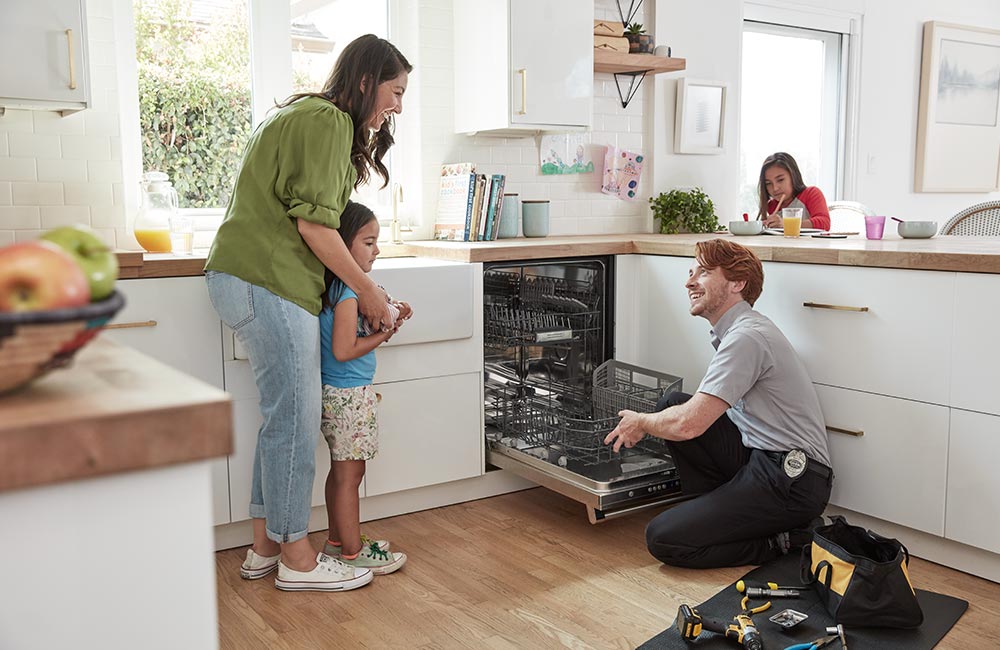Why Your Washing Machine Won’t Drain – Dependable Refrigeration & Appliance Repair Service Washing Machine Repair
Why Your Washing Machine Won’t Drain – Dependable Refrigeration & Appliance Repair Service Washing Machine Repair
Blog Article
The Ultimate Guide to Recognizing Home Appliance Repair in the house
When your fridge quits cooling or your oven rejects to warm, it can really feel overwhelming. Comprehending home appliance fixing in your home can save you money and time. You'll discover to acknowledge symptoms, utilize important tools, and comply with a systematic troubleshooting procedure. However before you begin, there are essential security preventative measures you need to think about. What are one of the most typical problems, and how can you fix them? Allow's explore the fundamentals.
Common Appliance Troubles and Their Symptoms
When your home appliances start acting up, it's necessary to acknowledge the indicators beforehand. Ignoring them can cause larger issues and expensive fixings. If your fridge isn't cooling properly, you might see cozy areas or condensation forming. This can indicate a falling short compressor or a blocked vent.Your dishwasher might show troubles through dirty meals or unusual noises throughout cycles. If you hear grinding or clanking, it's time to investigate.A cleaning equipment that won't spin or drain can leave you with soggy laundry, suggesting a stopped up drainpipe or a malfunctioning pump.Lastly, if your oven's temperature level appears off or it takes forever to pre-heat, you may be dealing with a damaged thermostat. By remaining sharp to these signs and symptoms, you can deal with concerns prior to they rise right into significant repair work.
Vital Tools for Home Appliance Repair Work
When you're tackling device repair work in your home, having the right devices is necessary. Fundamental hand tools like screwdrivers and pliers will certainly help you dismantle and take care of various appliances, while electric screening devices guarantee you're functioning securely with circuitry. Let's look at what you require to get going on your repair work journey.
Fundamental Hand Devices
Having the right tools is important for reliable home appliance repair service in your home. Beginning with a dependable screwdriver set, including both flathead and Phillips kinds, as screws prevail in appliance setting up. Pliers are additionally vital; they aid with gripping, twisting, and reducing cords or small parts. A set of needle-nose pliers can reach difficult situations conveniently. You'll need a good flexible wrench for tightening up or loosening nuts and screws. An energy blade comes in handy for puncturing product packaging or insulation. Don't forget a tough workbench or surface to safely organize your tools and parts. With these fundamental hand tools, you'll be well-prepared to take on most appliance repairs that come your way.
Electric Screening Tools
Together with standard hand tools, electrical screening devices play an essential role in device repair. These devices assist you identify electrical concerns and warranty appliances work securely. A multimeter is important; it determines voltage, existing, and resistance, permitting you to identify troubles promptly. A non-contact voltage tester is an additional essential, allowing you identify live cables without making straight call, boosting your security. Secure meters are terrific for measuring present flow in wires without separating them, saving you time and initiative. In addition, circuit testers can swiftly examine if electrical outlets are functioning correctly. By making use of these tools, you'll enhance your troubleshooting process and boost your repair service skills, making appliance upkeep a lot simpler.
Step-by-Step Overview to Diagnosing Home Appliance Issues
When your device acts up, it can be frustrating, but diagnosing the issue does not need to be frustrating. You'll learn to recognize typical issues and apply efficient troubleshooting strategies. Let's go through the actions to get your appliance back in working order.
Typical Appliance Troubles

Repairing Techniques Clarified

Fixing Significant Kitchen Area Home Appliances: A Closer Look
Have you ever wondered how to take on typical problems with your kitchen area home appliances? Repairing significant kitchen area home appliances like fridges, ovens, and dishwashing machines can be much easier than you assume. Beginning by determining the issue-- whether it's a refrigerator not cooling or an oven that will not heat. Usually, an easy reset or examining the power source can solve the issue.For fridges, clean the condenser coils and examine the door seals. If your oven's not home heating, inspect the heating element and thermostat. Dish washers might just need a tidy filter or a reset to obtain them back at work. Constantly disconnect the device before diving right into repair services to ensure your safety.Don' t fail to remember to seek advice from the user guidebook for details fixing pointers connected to your version. With a bit of perseverance and the right devices, you can confidently tackle home appliance repair work and conserve cash at the same time!

Troubleshooting Laundry Equipments: Tips and Techniques
When your laundry devices start acting up, it can really feel frustrating, but troubleshooting them does not have to be a trouble. Begin by checking the power supply. Verify the appliance is connected in and the electrical outlet is functioning. Next off, check the door or lid switch; a malfunctioning button can prevent the maker from operating.For washing machines, if it's not rotating, look for unbalanced loads. Redistributing the clothes might fix the issue. If your clothes dryer isn't heating, clean the dust filter and examine the vent for blockages.Listen for uncommon noises; they can indicate a problem. If your device is dripping, check the pipes for fractures or loosened connections. Paper any kind of mistake codes displayed on digital screens, as they can lead you in recognizing the problem. Consult the individual guidebook for details repairing ideas associated to your model.
Safety Preventative Measures to Take Throughout Fixes
Prior to you begin any appliance fixings, it's necessary to focus on security to stop mishaps or injuries. Unplug the device or transform off the circuit breaker to assure no power reaches it while you function. Use insulated devices to minimize the threat of electrical shock. Put on safety and security goggles and handwear covers to secure yourself from sharp sides or debris (Dependable Refrigeration & Appliance Repair Service Washer repair near me).Make certain your office is tidy and well-lit, so you can see what you're doing. Keep kids and pets away from the area to avoid diversions and potential threats. If you're taking care of gas home appliances, be additional cautious; look for leakages before proceeding.Take your time, and do not hurry with fixings. why not try these out If you really feel uncertain concerning any step, it's better to pause and research than to guess. Following these safety measures will assist produce a more secure environment for your DIY appliance repair project
When to Call a Professional for Help
Exactly how do you understand if it's time to call in an expert my response for device repair work? If you've tried basic troubleshooting without success, it's a clear indication. If your device still won't begin or reveals uncommon sounds after resetting it, don't be reluctant to look for professional help.When you observe leaks, smoke, or burning smells, prioritize safety and call a professional quickly. These problems can lead to even more substantial damage or pose risks to your home.Also, if your device is under warranty, contacting a specialist is typically the very best route. They can assure that repairs will not nullify your service warranty, conserving you money in the long run.Finally, if you're unclear or awkward with complicated repair services, it's important to leave it to the professionals. Keep in mind, tackling complex issues without the ideal expertise can lead to pricey errors. Depend on a professional when unsure!
Often Asked Questions
Exactly How Can I Protect Against Device Problems in the Future?
To avoid device problems in the future, you must carry out routine maintenance, look for wear and tear, tidy filters, and stay clear of overloading. Staying proactive will assist expand their life-span and maintain them running smoothly.
What Are one of the most Common DIY Appliance Fixing Mistakes?
You might overlook security preventative measures, miss troubleshooting steps, or use incorrect tools when trying DIY home appliance repair work. Hurrying the procedure or ignoring producer standards can bring about even more significant problems and expensive blunders. Keep individual and educated!
How Do I Know if a Component Demands Substitute?
You can tell if a part needs substitute by looking for unusual sounds, leakages, or inconsistent performance. If the device battles to operate appropriately or reveals noticeable damage, it's likely time for a replacement.
Can I Use Generic Components for Appliance Repairs?
Yes, you can make use of generic components for device repair services, but ascertain they're suitable - Dependable Refrigeration & Appliance Repair Service Washing Machine Repair. Common components could conserve you money, but they might influence performance or longevity, so consider your options thoroughly before deciding
What Guarantees Cover Device Repair Works?
Many home appliance warranties cover repair services for making defects, however they you could look here usually omit damages from misuse. Check your warranty terms meticulously, as some might call for using qualified professionals and initial components for coverage to remain valid.
Report this page